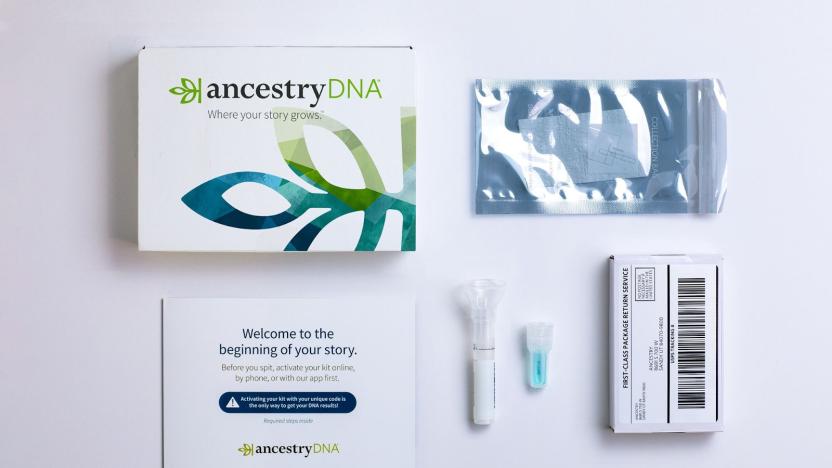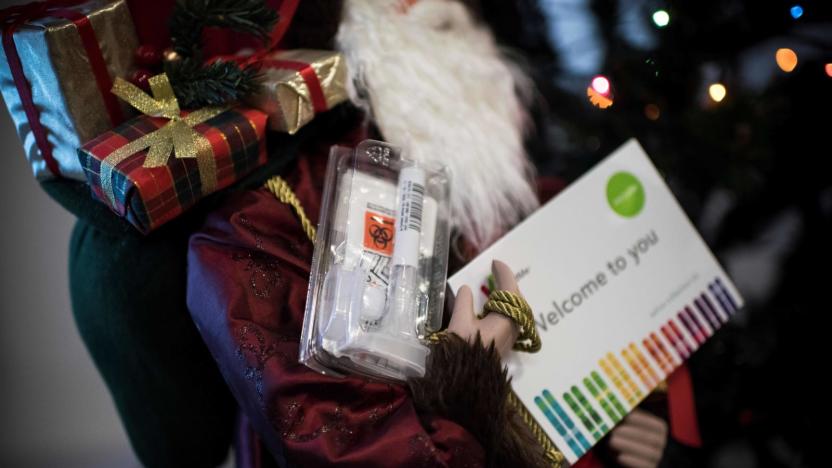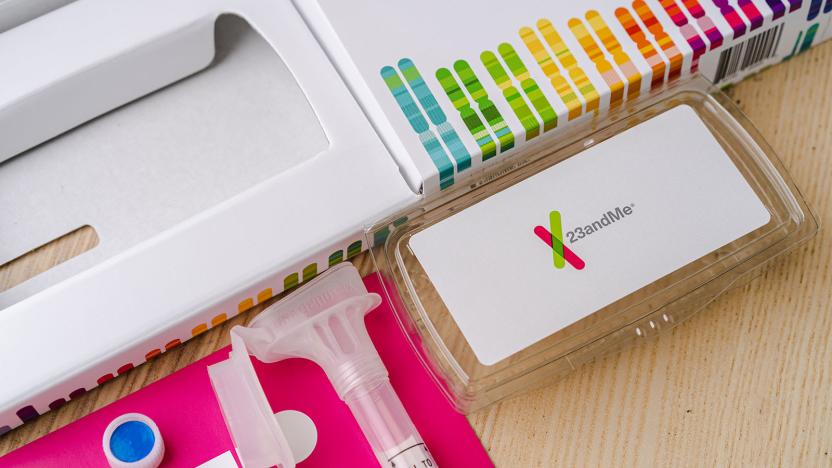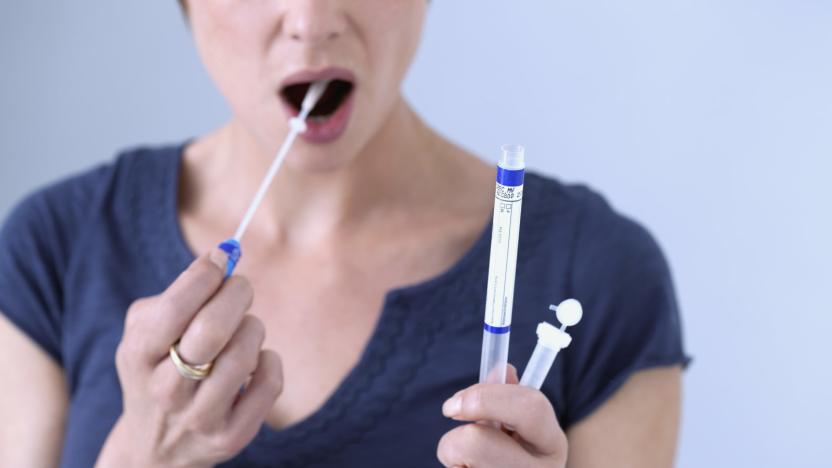DNA testing
Latest

Ancestry lays off 100 employees as DNA test demand dwindles
Ancestry has announced that it had to lay off six percent of its workforce, or around 100 workers, due to "a slowdown in consumer demand across the entire DNA category" over the past year and a half. The news comes just a few weeks after 23andMe, another home DNA testing service, revealed that it cut 100 workers because of dwindling sales.

Pentagon tells military personnel to avoid commercial DNA tests
The Pentagon has recently circulated a memo advising military personnel not to do at-home DNA tests, according to Yahoo News. It reportedly warned military members that mail-in commercial DNA tests are "largely unregulated and could expose personal and genetic information." They could also "potentially create unintended security consequences and increased risk to the joint force and mission," the memo read.

The best DNA testing kit
By Amadou Diallo This post was done in partnership with Wirecutter. When readers choose to buy Wirecutter's independently chosen editorial picks, Wirecutter and Engadget may earn affiliate commission. Read the full guide to DNA testing kits. Consumer-oriented DNA testing services come with inherent privacy risks and are bound by few legal guidelines regulating the use of your data. The ramifications of sharing your DNA with for-profit companies are continuously evolving. Opting into a recreational DNA test today will likely have future consequences that no one has even considered yet. If you're comfortable with that, we think AncestryDNA is the most effective service for people who want to learn more about their ethnic roots or find contemporary relatives. We've come to this conclusion after more than 80 hours of research and two-plus years of reporting that included evaluating the results from a test panel representing every major population group. The aptly named AncestryDNA test stood out as the best ancestry DNA test because it presented the test results in a clearer manner than other services and placed the information in a useful historical context. Since all the DNA services we tested provided broadly similar results for the ethnic origins of our panel of testers, AncestryDNA's better reports and interface gave it a clear advantage. Plus, for people seeking distant cousins or even biological parents, the company's claimed DNA database of 10 million customers—twice the size of its closest competitors—increases the odds of successful matches. Unlike the other services we tested, however, AncestryDNA cannot track your maternal and paternal heritage independently or trace your ancient migration path out of Africa. 23andMe offers the same type of ethnicity estimates (and privacy risks) as AncestryDNA at a similar price. With a DNA database of 5 million users, it may offer smaller odds of connecting with unknown relatives, but it does have the most polished site design, which makes navigating the myriad charts, reports, and explanatory documents easier than on competitors' sites. For male testers, 23andMe can provide a look at the ancient migration paths of both maternal and paternal lines independently. And while we don't cover biomedical testing in this guide, 23andMe does offer its customers a suite of reports on potential health indicators as a paid add-on service. FamilyTreeDNA offered broadly similar ethnicity estimates for our testing panel as AncestryDNA and 23andMe. Those concerned about privacy should know that it is the only service we're aware of that is voluntarily providing customer data access to law enforcement. FamilyTreeDNA does, however, provide the most comprehensive suite of testing options, offered as add-ons to the basic ethnicity test, than any service we evaluated. These additional tools should satisfy nearly any genealogy buff looking to explore their connections to early human migration or find relatives from one particular side of their family tree. The company's à la carte approach can quickly add up though. You can easily spend more than three times the testing cost of AncestryDNA or 23andMe.

How secure is DNA testing?
Scientists only mapped the human genome 16 years ago, but today you can get a basic test of your genetic code from Walgreens. It's estimated some 26 million people have already sent their spit to direct-to-consumer DNA-testing companies, and the number is predicted to multiply to 100 million by 2021.

Recommended Reading: Taylor Swift and Spotify are... best friends?
Taylor Swift is getting friendly with Spotify ahead of her new album, 'Lover.' Times have changed. Tim Ingham, Music Business Worldwide Not too long ago, Taylor Swift shook off Spotify, pulling her entire catalog from the service and slamming music streaming as "a grand experiment." Nearly five years later, amid a huge blow up with her former label, she's mighty cozy with the Sweden-based company that went public in 2018. It looks like the two sides have put aside their bad blood -- for now.

Airbnb's 'heritage travel' section is for exploring 23andMe results
23andMe has partnered with Airbnb to let users literally explore their roots. The travel website now has a special "heritage travel" section divided into the genetic populations you'd find in a 23andMe ancestry report. The regions include Sub-Saharan Africa, North Africa and West Asia, Central America and Mexico, South America, East and South Asia, the Caribbean and Europe. After finding out where their ancestors hail from, 23andMe customers can click through to a specific region and plan a trip.

Family Tree DNA will let customers opt-out of the FBI's genetic data access
Genealogy company Family Tree DNA hit the headlines last month after it was revealed the firm had given law enforcement agencies access to its DNA database. The FBI was allowed to comb through the information in a bid to identify crime suspects, igniting confidentiality concerns and privacy fears. Now, the gene-testing service has announced it will let customers bar law enforcement from accessing their data.

23andMe plans to use your genetic data to create new drugs
For over a year now, 23andMe has been stuck in a regulatory quagmire with the US Food and Drug Administration (FDA). Although it's still able to sell its personal DNA kits, the company is effectively banned from offering health-related genetic tests in the US. A few weeks ago it was given the go-ahead for a single check, a rare disorder called Bloom syndrome, but it's only a small step towards the broader health reports it provided before. While it waits for wider FDA approval, 23andMe has decided to enter the drugs market. The company already works with major pharmaceutical firms including Pfizer and Genentech, but now it's prepared to go it alone. The startup has accrued a vast amount of health-related information from its users, so there's an obvious opportunity to apply that database to the field of medicine. Instead of just looking for health-related ailments, and offering users the results, 23andMe wants to go one step further and develop the cures too.

23andMe gets FDA approval, but only to test rare Bloom syndrome
For over a year now, 23andMe has been effectively banned from offering its US customers health-related genetic tests. The company is still selling its personal DNA kits, but the information it can provide is limited to ancestry-related reports and raw genetic data. The US Food and Drug Administration (FDA) was behind the original clampdown in 2013, but this week it's given the company its blessing for a new test. With the fresh approval, 23andMe can now offer to look for signs of Bloom syndrome, a rare disorder which is characterized by short stature, sun-sensitive skin and increased cancer risk. While this is a specific test, rather than the broader health reports it offered before, 23andMe calls it an "important first step" to offering detailed genetic advice in the US once more.

23andMe's £125 DNA testing service launches in the UK
While more and more technology companies are shifting their focus to include health tracking, none go quite as in-depth as 23andMe. The self-branded "personal genetics company" made its name in the US and Canada for mail-order DNA test kits that provide customers with an overview of their genetic ancestry and provide a risk assessments for certain diseases based on genetic data. That was until its very public spat with the Food and Drug Administration (FDA), which told 23andMe to stop offering disease analysis until it received the medical device classification it needed. The ban is still in place, but 23andMe has continued to offer (with approval) its ancestry-related reports and "uninterpreted raw genetic data" to customers.

Oxford makes big push into Bigfoot research, enlists Swiss zoologists for DNA study
The search for Bigfoot continues and, no, that's not a nod to a very special episode of Unsolved Mysteries. Though Harry and the Hendersons did its best to humanize that monster of myth, a group of well-heeled European scientists are seeking to go beyond the Hollyweird fantasy to actually prove the creature's existence using advanced genetic techniques on Yeti remains. Part of a collaborative effort between Oxford University and the Lausanne Museum of Zoology, the Collateral Hominid project aims to gather material from public and private cryptozoological collections for analysis to determine whether that elusive species branched off from bears or our neanderthal forebears. Project head Prof. Bryan Sykes hopes the research, the results of which will eventually make the rounds of peer-reviewed journals, will dispel skepticism that has surrounded this controversial creature by providing " a mechanism for... identification that is unbiased, unambiguous and impervious to falsification." Basically, these real-life Mulder & Scullys want incontrovertible DNA proof that these fantastic ape-like beings are simply the stuff of evolution. Whatever the case, the truth is most certainly out there, folks -- it's just likely encased in fossilized dung. [Image courtesy Worch.com]

Time names the 23andMe retail DNA test 'Invention of the Year'
Time Magazine has released its annual Best Inventions issue, and topping the list is the 23andMe retail DNA test, a kit which which offers consumers 23 clinical reports on their genetic risk for everything from Psoriasis to Prostate Cancer. It may not be as well known as last year's iPhone (or YouTube the year before that), but the $399 package might signal a significant revolution in preventative medicine... or it might bring mankind a disturbing new form of eugenics. Whatever you use it for, the process couldn't be easier: the kit comes with a tube that you spit in and mail back to the company, which in a mere 4 - 6 weeks will notify you that testing is complete. As you wait for the results to be posted online you might want to spend some time contemplating the ethical dilemmas posed by this technology.







